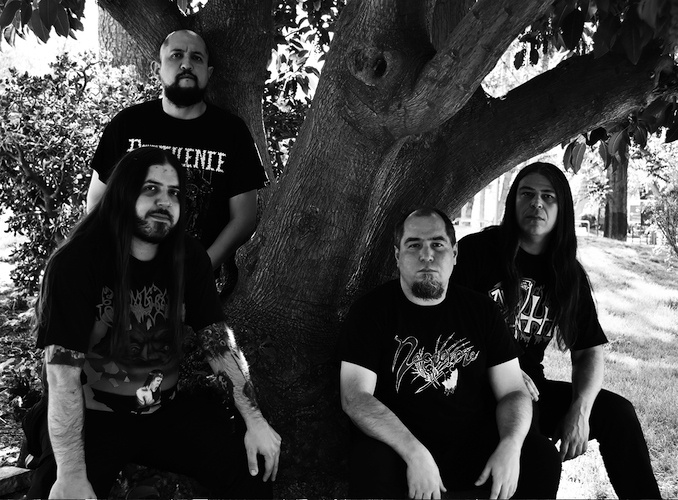
(Last month Memento Mori released the superb third album by Inanna, their first one in 10 years. We helped spread the word through this premiere, and the occasion also prompted Comrade Aleks to get in touch with the band. Today we present that great conversation below.)
There are bands which grant not only the twisted pleasure of listening to their (extreme) music but also with a simple communication, and the Chilean outfit Inanna gave me both. Their new album Void of Unending Depths was released by Memento Mori in late April, and I’m excited with their wicked, a bit blackened, and progressive, death metal rituals.
Why rituals? Well, because the band’s lyrics deal with things extra-terrestrial, occult, and divine. There’s a sense of Lovecraftian madness here, do you feel it? And besides that, the guys are absolutely easy and interesting interlocutors, so let’s not waste our time with just my mumbling, and let’s get straight to the point.
******
Hail Inanna! How are you? What’s new in your camp? And who’s answering today?
Max: Hail to all the maniac readers of No Clean Singing! We thank you for the opportunity to be included within this cursed cavern, where good writing prevails. Our camp has been running at its full capacity for the past few months, fully focused on rehearsarsing for our return to the stage after two and a half years. Today’s guests to answer your questions are Carlos Fuentes and Max Neira.
The band was founded in 2000 — just three years more and it’ll turn 25 years old, a huge piece of one’s life. How would you summarize your experience with Inanna? What are the band’s milestones?
Max: Wow, now that you mention it, that’s a lot of time, but let’s hope the clock moves slowly before to get to those 25 years. Playing in the same band for so long almost continuously can be summarized to a sort of coming-of-age story, because when we started this enterprise we were nothing more than a bunch of carefree post-teens, and now we see life as grown-ups with responsibilities and other daily problems. Despite a few gray hairs along the way, we still can’t consider ourselves a bunch of grumpy old men, not yet.
We have plenty of milestones during this journey, from our first gigs and the reaction of the bangers, which took us some time to assimilate. Starting with bewildered and somewhat reticent faces, then lukewarm applause, then masses of revolving hair in neckbreaking headbanging, ending with guys coming up to congratulate us on the music, now bewildering us, but with a sense of a job well done. Those moments will always be hard to erase.
In short, our north has always been to search for the music we like the most, and above all to write, prepare and make each of our recordings, including our first demo in July 2001. Personally, I have forgotten many moments of this story, but I remember in detail those recording sessions, and how we gradually learned all the tricks to create an album. These 22 years can be considered a milestone in itself.
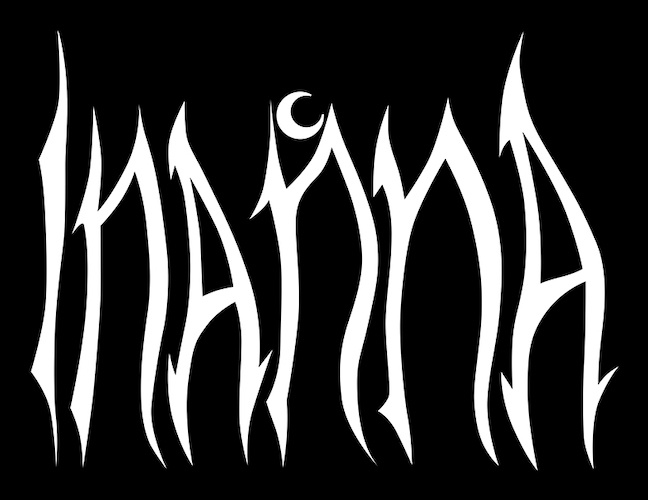
Why did you choose the name of a Mesopotamian goddess as the band’s title? Did you aim to play a tour with Marduk and Tiamat?
Max: Well, to be honest, it’s obvious our teenage years obsessed with Morbid Angel had something to do with it. Diego began this thing alone on his own, hidden for a long time in his room with only the company of his guitar. As a fan of history, he found a xeroxed version of the Necronomicon, and after some reading he decided to choose the name Inanna, remembering other female deities from other cultures such as Athena, Gaia, Hera and many more. In those days, I was very into Lovecraft reading, and that link with the “Necronomicon” was discovered, therefore, the name seemed appropriate and unprecedented for a new band, which also gave us a starting point to everything that concerns our lyrics to this day.
Marduk and Tiamat both are iconic bands, and of course we would like to tour with them, but not because their names belong to Sumerian mythology. In that case we could fill a whole bill of bands with that kind of names. We just told you that we would always be willing to take the road accompanying established bands, but we are not too worried for now. In Chile, our greatest achievement in that area was being able to open for Suffocation in 2018, and have the chance to share with our teenage heroes, especially a few minutes of chat with Professor Terrance Hobbs.
Inanna’s trademark is a tendency towards progressive elements, which you’ve incorporated into your music for years. How do you see role of this side in your music? Are you fascinated with the technical side of these structures or does it help you to keep this atmosphere of insanity and crawling chaos?
Carlos: If you listen to Death Metal you know that it is a style surrounded by diverse influences; minimalist, technical bands, some slower, others faster, with cavernous riffs, sophisticated riffs, melodic, dissonant, you get the picture. It’s impossible to present ourselves as a Death Metal band without exploring the dimension that the style has drawn throughout its existence. Of course this is accompanied by a group of music maniacs who make it possible to share compositions with absolute freedom, and define them within the margins that we enjoy and makes us feel Inanna.
There are different forms of death metal, as you mentioned. “Traditional”, melodic, brutal, technical, blackened or “doomed”, etc. What are the most precious, most important aapects of the genre you care to keep in Inanna?
Max: It’s true, there are many nooks and crannies to research in the metal landscape, and you’ve named a handful of them. The beacon that guides Inanna mainly calls us to places where speed, aggression, brutality, fright, disbelief and dread reign — the most crucial Death Metal music features since its inception. Our ’70s progressive rock background was able to slip through the cracks of this monstrosity and soak it in mystery during the search for titanic structures, chord progressions full of mysticism in search of paths that land in something more melodic, if you will. Above all, as I said at the beginning, powerful speed and an eerie atmosphere is our greatest purpose. Metallica already cried it out 40 years ago: “Bang your head against the stage like you never did before / Make it ring, make it bleed, make it really sore.” There is no verse that sums it up better.
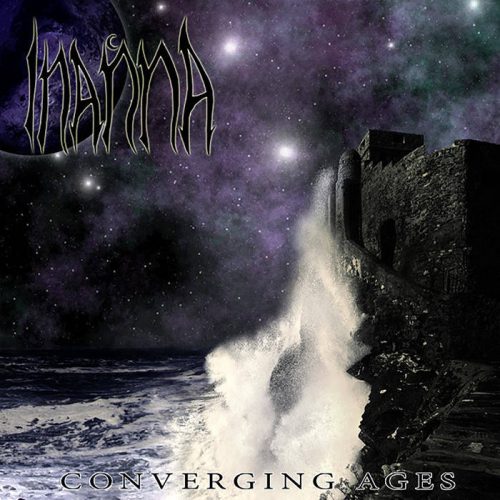
Your first album Converging Ages was released 14 years ago. How much does it differ from Void of Unending Depths from your point of view?
Carlos: They are very different, but they share the visión quest that we defend as a band, which is to explore any inspiration that we may be experiencing that contributes to the development of our Death Metal. Converging Ages was the closure of the training stage. Although I recorded there as a guitarist, we had already impregnated the contributions of my predecessor Rodrigo Krell, who managed to share creatively with Diego, Max and Felipe, and therefore the lines were quite drawn, while Void of Unending Depths feels more like a confirmation of teamwork, a work line who know each other very well as individuals, since even Cristóbal, our new guitarist, has already shared in the past personally and musically with each one of us. Void is nothing more than a natural continuation of all our recording efforts.
What were the most difficult moments during the Void of Unending Depths recording session?
Carlos: The most complex thing was how the sanitary measures due to the pandemic affected us. From the start, the pre-production of this album was unusual for us, since we had to do everything remotely, and for a band accustomed to proximity, it cost us to create and refine a working method that didn’t depend on the rehearsal work and made us feel glad with the results, but it was achieved.
Then, at the time of recording, we had to wait for the restrictions to allow us to move freely, losing much of the time we had to mix and mastering, and forcing me to self-register in our rehearsal room, since the studios were not operating yet, at the moment we decided to say: “Let’s not wait any longer, let’s start recording”. When we started recording strings, the measurements became somewhat lighter and that helped the rest of the process not to be as complex as it was at first, but the making of Void was plain insanity.
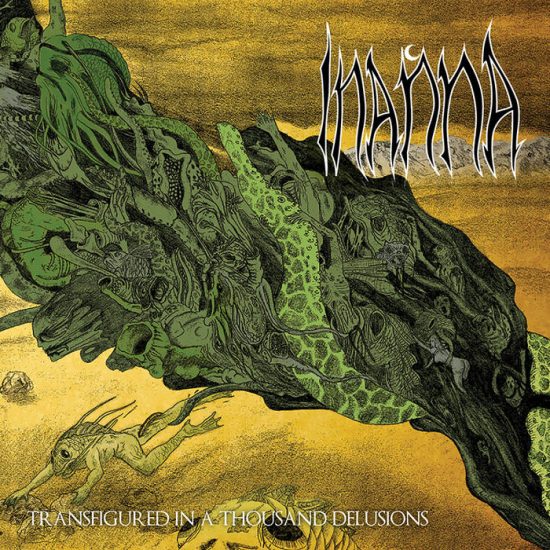
Carlos is the sound engineer behind few dozens of albums, and you recorded two albums with him as the sound engineer. Would you say that the recording of Void of Unending Depths differed from the way you recorded Transfigured in a Thousand Delusions?
Carlos: Honestly, we work in a very similar way, but due to different circumstances. In Transfigured in a Thousand Delusions I was just starting my career and had already worked a couple of LPs in my home studio, so we managed the process internally for practical and budget reasons. However, my equipment at that time was quite simple, I did not have a room equipped to work and I was still ignorant in many processes, which is not the case now.
With Void of Unending Depths we worked internally by a band determination and not to depend on another professional who could delay things even more due to the complications caused by the pandemics. Our aesthetic continues to be far from the plastic sound, therefore we knew we could do it among ourselves and feel comfortable with the result, even though we would have enjoyed working on this LP with some professional as a kind of consultant from outside the band.
Carlos, you performed guitars since 2003 and until 2017 and then you switched to drums. How did it happen? Did it affect much on the composing and recording process?
Carlos: I can tell this from my personal perspective. After Felipe‘s departure, I was immediately motivated to occupy the position of drummer, but I didn’t propose it until we had some auditions as a band, because it seemed interesting to me to see what would happen with the appearance of a new drummer. But that was lingering to the point where we had no new people to audition and we hadn’t felt entirely comfortable with the prospects, several of them very talented, but for some reason we just couldn’t connect. That’s how I set out to do it and it worked quite well. For a long time we performed live as a trio, and then our old pal Cristóbal joined us, completing the lineup.
I continue as a songwriter and contribute as a guitarist to the band, that’s still on, and Cristóbal’s arrival adds another composer, therefore we continue in the law of all creatively contributing, maintaining the essence that we have defined as Inanna.
It seems that Cristóbal was more into blackened death metal before. Did you feel the seduction to add more of that kind of stuff to Inanna’s sound?
Carlos: Cristóbal is an absolute music enthusiast, but when it comes to playing the guitar his pleasure is to dig into the dissonant and dark enviroments. His contribution as a sole songwriter in “Far Away in Other Spheres” was exactly that, however we all have a fondness for Black Metal, especially Diego who already in tunes like “Ancestral Raging Tides” or “Beyond Time and Memory” added within his writing composition segments of marked death-blackish forms. It has never been a limitation for us to look for inspiration in fellow styles such as Thrash, Black or Doom. Anyway, Void of Unending Depths is perhaps one of our most open albums in terms of riffing, which can be seen as an attempt to get closer to blackened death, but it is was absolutely circumstantial in this precise musical period.
Inanna’s lyrical themes deal with “Lovecraftian horror” according to Metal-Archives, but as far as I see there’s a direct reference to Cthulhu Mythos only in your new song “Underdimensional”. So how much of Lovecraftian influences are in your songs?
Max: You’re right, now looking back “Underdimensional” is the only song with direct allusions to the Cthulhu Mythos, maybe on purpose, because we’ve never wanted to write our lyrics as a religious sort of thing. In this particular album, his communion with themes related to the ocean and its mysterious nature is very palpable. The Lovecraftian horror is always an important incentive, mainly thanks to his insane and perfect writing, and his careful use of words, which magnificently illustrate madness, anxiety, depression, anger, painting horrific mental landscapes where we can swim along his nightmares. The insignificance of the human race and its relationship with the Cosmos. We create our own stories based on all the darkest passages of the human mind, and expel them in aggressive and disgusting frightening prose.
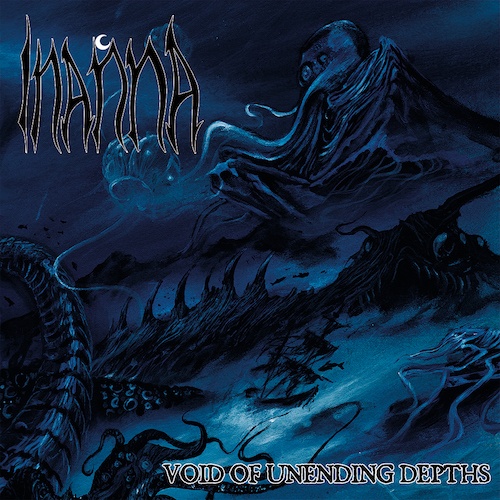
You have a lot of songs about ancient gods, so how do you see the influence of Lovecraft’s own ancient myths on your own mythology?
Max: Well, some of that is already covered in the previous answer. These are just some of our songs that take direct influence from his mythology and stories such as “Beyond Time and Memory”, “Embracing the Fleshless Ecstasy”, “Ascend from the Underworld”, “The Crescent Portal of Insanity”, and “Ancestral Raging Tides”. While we’ve been able to grow as musicians and lyricists, we’ve been able to find our own way, not relying so directly on particular HP stories, but I can honestly say that his horrid stories are always present throughout our catalogue, even in the instrumental pieces. We do not see him as a god or a supernatural entity, but as a human being placed in the crazy 1920s and 30s, tormented, depressed, despairing, and with an insatiable thirst for knowledge and science.
Metal music is an international form of communication but often bands have their “local”, cultural mentality reflected in their songs. Do you see Chilean traces in Inanna?
Carlos: As much as it is not evident, of course there is the influence of our Folk roots in Inanna. There are different ways of addressing this, because there is “Chilenidad” in everything related to the band, from musicians or local groups that we admire as the most obvious, and in a more abstract way in the history and diverse spoken cultures that each one of us has in their backs that have forged our personalities, and ergo, our music. Specifically, you can hear it in songs like “Beyond Time and Memory”, which includes a segment of a Cueca time signature (our traditional national dance), and you can feel it in the acoustic chords which end “Gilgamesh” that correspond to a typical Andean progression, as well as in “Cabo de Hornos” both in the lyrics and in the landscapes that the music seeks to recreate, etc. We don’t seek to make this obvious, but origins are important to any musician, and they live in our compositions.
I haven’t interviewed Chilean bands for awhile… the last one was Poema Acanvs nearly a year ago. What’s going on within the scene nowadays? Did the quarantine and those protests two years ago affect it?
Carlos: As a Sound Engineer, I work very closely with musicians on the scene, and I can say that there is a lot of quality material that has recently entered the different production and recording studios in Chile. The scene outside Santiago, from regional cities, is very strong, likewise in the capital, so it is always in constant movement and it is a scene that, although affected by many difficulties, has managed to sail an odyssey of different stages that handled to resist and open their doors for more shows as soon as they could. Well, building these spaces has been the task of a few music addicts who, with enormous endurance, hold fast to their vision of always keep Metal in good health.
Do you see the local scene as an isolated one? We know a lot of excellent bands from your part of the world, but somehow a problem of promotion seems to be a constant one. Especially now when people are occupied with new forms of “crisisis” almost each month.
Carlos: That’s a real problem. The bands who have managed to reach more devotees internationally have achieved it with the support of foreign labels that have a much larger spread and have a consolidated network of contacts between distros, magazines, festivals, and so on, which local labels have failed to match. Many bands here also try to do things independently, but it is a very winding path. I would say that thanks to the Internet and mainly YouTube and Bandcamp, foreign listeners have been getting close to knowing underground acts that never managed to leave Chile, and that now they have been able to tour and sell material abroad. That is something that still needs to be improved and to be able to create alliances so that the groups can reach more effectively their potential international following.
How often do you play live now? And what are your plans regarding gigs for 2022?
Max: Now practically nothing. Well, it is understandable knowing what has happened in the world during the last two and a half years. We organized by ourselves Inanna‘s return to the stage for May 27, and there’s are a few invitations to participate in gigs in other cities in Chile. When we were younger we used to play live as much as possible, but nowadays we don’t care so much about being on every bill, we take things slow and give all our available time to write new music for future recording works.
Thank you for the interview gentlemen. Let’s hope this year will be more fortunate for the metal scene and that the cult of Inanna will rise. Any final words of Messopotamian death metal wisdom for our readers?
Max: Thanks to you. We really feel very welcome in the virtual pages of NCS, and we appreciate your words of encouragement and strength. For your readers, just to say that Death Metal will always prevail over the fads or nostalgic throwbacks. The only words of wisdom I could give you is that this is music above all else, and you can use whatever tools you have at hand to deliver it, always being faithful to your own intuition and values, and what the rest think about you or talk behind your back is total and utter crap. Cheers!
https://inannametal.bandcamp.com/
https://www.facebook.com/INANNA-60421365944
